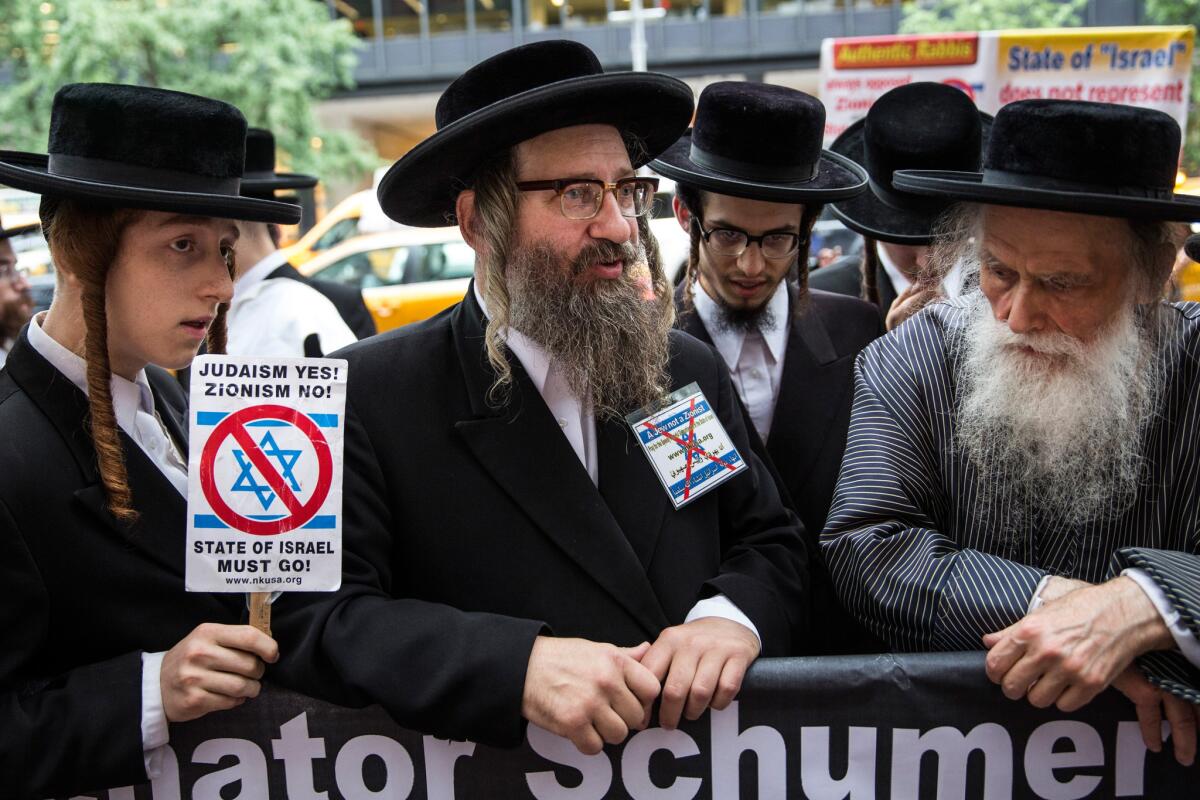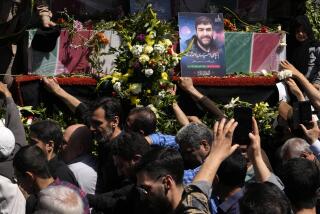Rhetorical abuse over Iran deal is troubling, Obama tells Jewish groups

Anti-Zionist Orthodox Jews protest outside U.S. Sen. Chuck Schumer’s Manhattan offices this month over his decision not to support President Obama’s Iranian nuclear deal.
President Obama insisted Friday that he and fellow supporters of the Iran nuclear deal have received more rhetorical abuse than they’ve dished out in the divisive debate over the agreement.
Speaking to two Jewish groups in a live webcast from the White House, Obama said he had to “challenge a little bit the idea that there’s been an equivalence in the heated rhetoric.”
He noted that Rep. Jerrold Nadler was labeled a “traitor” and other slurs last week after he became the lone Jewish Democrat from New York to endorse the deal, which would lift economic sanctions on Iran in exchange for limits on nuclear enrichment.
Nadler has been “attacked in ways that are appalling,” Obama said. It was “the kind of stuff that people have to be deeply concerned about.”
In response to questions, Obama denied he had labeled critics of the deal “war mongers.” But he repeated his argument that rejection of the deal would allow Iran to continue enriching uranium and leave few options but military action to stop the country from obtaining enough for a nuclear weapon.
Congress faces a self-imposed Sept. 17 deadline to vote on a resolution to reject the deal. But the White House appears to have built a firewall in the House, where more than enough Democrats have signaled they will support a presidential veto if necessary, and may win sufficient support in the Senate as well.
NEWSLETTER: Get the day’s top headlines from Times Editor Davan Maharaj >>
Critics who insist Congress should reject the deal, and the White House should restart the negotiations, are misinformed, Obama said. The United States can’t renegotiate the deal without the support of the five other countries who bargained for the current deal, nor could it force Iran back to the table with U.S. sanctions alone.
He took questions from leaders of the Jewish Federations of North America and the Conference of Presidents of Major American Jewish Organizations.
With Israel’s government fiercely opposed to the deal, the issue has deeply divided American Jews and led to bitter conflicts within some congregations.
Many American Jewish organizations oppose the deal, although some polls suggest that the majority of American Jews, as individuals, support it.
Some opponents have claimed an anti-Semitic undertone in supporters’ complaints that pro-Israel groups were spending tens of millions of dollars on lobbying campaigns.
Obama said he sought to ignore the angry denunciations of America by Iran’s supreme leader, Ayatollah Ali Khamenei, the country’s most powerful figure. Obama said he considered the invective as political messages meant for a domestic audience.
“He’s a politician and I guess that’s the way politicians operate, even in Iran,” Obama said.
Although Iran will receive an estimated $56 billion from frozen overseas accounts when the deal gets underway, Obama played down the potential effect. He said most of the windfall will pay for domestic needs, and said no analysts are predicting that it will bring a “qualitative change” in Iran’s military.
Obama said future presidents will be in a stronger position to respond if Iran seeks a nuclear bomb after the ban on enrichment expires in 15 years. The future president can still use sanctions or military action, but with the benefit of 15 years of on-the-ground intelligence about Iran’s nuclear activities, he said.
Obama emphasized his personal support for Israel and the American Jewish community.
“I wouldn’t be sitting here if it weren’t for the friendship and support of Jewish supporters across the country,” he said.
In Tehran, Friday brought new evidence that Iranian hard-liners are coming around to the accord, two days after Khamenei offered tacit support by officially thanking the negotiating team. Khamenei coupled that, however, with an urging to be “careful and cautious” about U.S. and Israeli “trickery.”
At Friday prayers, the most important of the Muslim week, imams echoed Khamenei’s language. These sermons are carefully vetted as policy statements, and the one at the main prayers in Tehran refrained from any direct attacks on the accord, even while warning that “enemies want to create misunderstandings … in the post-sanctions era.”
Times staff writer Laura King in Cairo contributed to this report.
ALSO:
Iran nuclear deal could become a perennial cliffhanger
Breaking with White House, New York’s Schumer opposes Iran nuclear deal
Critics of Iran nuclear deal allege secret side agreements
More to Read
Start your day right
Sign up for Essential California for news, features and recommendations from the L.A. Times and beyond in your inbox six days a week.
You may occasionally receive promotional content from the Los Angeles Times.







